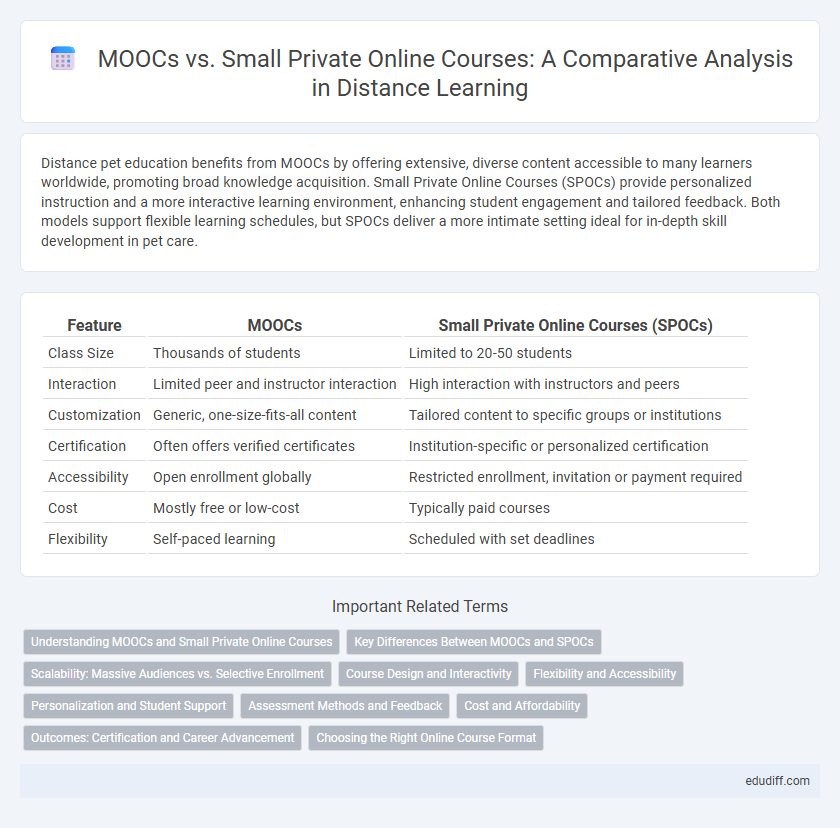Distance pet education benefits from MOOCs by offering extensive, diverse content accessible to many learners worldwide, promoting broad knowledge acquisition. Small Private Online Courses (SPOCs) provide personalized instruction and a more interactive learning environment, enhancing student engagement and tailored feedback. Both models support flexible learning schedules, but SPOCs deliver a more intimate setting ideal for in-depth skill development in pet care.
Table of Comparison
| Feature | MOOCs | Small Private Online Courses (SPOCs) |
|---|---|---|
| Class Size | Thousands of students | Limited to 20-50 students |
| Interaction | Limited peer and instructor interaction | High interaction with instructors and peers |
| Customization | Generic, one-size-fits-all content | Tailored content to specific groups or institutions |
| Certification | Often offers verified certificates | Institution-specific or personalized certification |
| Accessibility | Open enrollment globally | Restricted enrollment, invitation or payment required |
| Cost | Mostly free or low-cost | Typically paid courses |
| Flexibility | Self-paced learning | Scheduled with set deadlines |
Understanding MOOCs and Small Private Online Courses
Massive Open Online Courses (MOOCs) offer open access to large audiences worldwide, enabling unrestricted enrollment and diverse course offerings across various disciplines. Small Private Online Courses (SPOCs) provide a more focused, limited enrollment experience, emphasizing personalized interaction and tailored content to enhance learner engagement and outcomes. Understanding the differences in scale, accessibility, and instructional design between MOOCs and SPOCs is crucial for selecting appropriate distance learning platforms.
Key Differences Between MOOCs and SPOCs
MOOCs (Massive Open Online Courses) offer unrestricted access to thousands of learners worldwide, promoting large-scale participation with standardized content. SPOCs (Small Private Online Courses) are designed for limited enrollments, providing tailored instruction, interactive sessions, and personalized feedback. The key difference lies in scalability versus customization, where MOOCs emphasize broad accessibility and SPOCs prioritize intensive, focused learning experiences.
Scalability: Massive Audiences vs. Selective Enrollment
MOOCs accommodate massive audiences by leveraging scalable technologies and open enrollment, enabling thousands of learners to access courses simultaneously. Small Private Online Courses (SPOCs) prioritize selective enrollment, offering tailored interactions and personalized feedback to a limited number of participants. This selective approach enhances engagement and learning outcomes but limits scalability compared to the broad reach of MOOCs.
Course Design and Interactivity
Small Private Online Courses (SPOCs) offer highly customized course design tailored to niche audiences, enhancing learner engagement through personalized content and direct instructor interaction. MOOCs typically emphasize scalable course structures with automated assessments and peer forums to support large, diverse enrollments but may lack individualized feedback. SPOCs leverage interactive elements such as live discussions and real-time assessments to foster deeper collaboration and active learning experiences.
Flexibility and Accessibility
MOOCs offer extensive flexibility and accessibility by allowing unlimited enrollment and self-paced learning, making education reachable to a global audience. Small Private Online Courses (SPOCs) provide a more structured environment with limited participants, enhancing personalized interaction but reducing scalability. The choice between MOOCs and SPOCs depends on the need for broad accessibility versus targeted, flexible engagement.
Personalization and Student Support
Small Private Online Courses (SPOCs) offer enhanced personalization and student support compared to MOOCs by limiting class sizes, allowing tailored feedback and interactive learning experiences. SPOCs utilize adaptive learning technologies and dedicated instructors to address individual student needs, fostering higher engagement and improved outcomes. In contrast, MOOCs generally feature large, diverse cohorts with standardized content, limiting opportunities for personalized assistance and direct instructor interaction.
Assessment Methods and Feedback
MOOCs primarily utilize automated quizzes, peer assessments, and discussion forums for assessment and feedback, enabling scalability but often lacking personalized responses. Small Private Online Courses (SPOCs) offer more tailored assessment methods such as instructor-graded assignments, personalized feedback, and synchronous evaluations, enhancing learner engagement and mastery. The contrast in assessment methods impacts the quality and immediacy of feedback, with SPOCs providing a more interactive and supportive learning environment compared to the largely standardized approach in MOOCs.
Cost and Affordability
MOOCs typically offer free access to course materials, making them a cost-effective option for learners worldwide, while certification often comes at a modest fee. Small Private Online Courses (SPOCs) usually require upfront tuition payments, reflecting their smaller class sizes and personalized instruction, which can increase overall costs. Affordability for MOOCs is driven by open access and scalability, whereas SPOCs target niche audiences with higher per-student investment.
Outcomes: Certification and Career Advancement
MOOCs typically offer widely recognized certification that can enhance resumes and demonstrate skills to employers, though these certificates vary in industry acceptance. Small Private Online Courses (SPOCs) provide more personalized assessments and often include mentor feedback, leading to deeper skill mastery and stronger career advancement opportunities. SPOCs tend to facilitate better networking and tailored career services, increasing job placement rates compared to MOOCs.
Choosing the Right Online Course Format
Massive Open Online Courses (MOOCs) offer extensive, flexible learning environments accessible to thousands of students worldwide, ideal for those seeking broad knowledge or introductory skills. Small Private Online Courses (SPOCs) provide a more intimate, interactive setting with personalized feedback, better suited for specialized topics and learners requiring tailored support. Selecting the right format depends on individual goals, preferred interaction level, and the desired balance between accessibility and engagement.
MOOCs vs Small Private Online Courses Infographic

 edudiff.com
edudiff.com